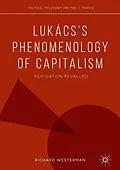This book offers a radical new interpretation of Georg Lukács's History and Class Consciousness, showing for the first time how the philosophical framework for his analysis of society was laid in the drafts of a philosophy of art that he planned but never completed before he converted to Marxism. Reading Lukács's work through the so-called "Heidelberg Aesthetics" reveals for the first time a range of unsuspected influences on his thought, such as Edmund Husserl, Emil Lask, and Alois Riegl; it also offers a theory of subjectivity within social relations that avoids many of the problems of earlier readings of his text. At a time when Lukács's reputation is once more on the rise, this bold new reading helps revitalize his thought in ways that help it speak to contemporary concerns.
Autorentext
Richard Westerman is an Associate Professor at the University of Alberta, Canada. He completed his PhD at Cambridge, before a postdoctoral fellowship at the University of Chicago. His work is primarily on Lukács and the Frankfurt School, and he has also published on philosophical aesthetics.
Klappentext
This book offers a radical new interpretation of Georg Lukács's History and Class Consciousness, showing for the first time how the philosophical framework for his analysis of society was laid in the drafts of a philosophy of art that he planned but never completed before he converted to Marxism. Reading Lukács's work through the so-called Heidelberg Aesthetics reveals for the first time a range of unsuspected influences on his thought, such as Edmund Husserl, Emil Lask, and Alois Riegl; it also offers a theory of subjectivity within social relations that avoids many of the problems of earlier readings of his text. At a time when Lukács's reputation is once more on the rise, this bold new reading helps revitalize his thought in ways that help it speak to contemporary concerns.
Zusammenfassung
This book offers a radical new interpretation of Georg Lukács's History and Class Consciousness, showing for the first time how the philosophical framework for his analysis of society was laid in the drafts of a philosophy of art that he planned but never completed before he converted to Marxism. Reading Lukács's work through the so-called Heidelberg Aesthetics reveals for the first time a range of unsuspected influences on his thought, such as Edmund Husserl, Emil Lask, and Alois Riegl; it also offers a theory of subjectivity within social relations that avoids many of the problems of earlier readings of his text. At a time when Lukács's reputation is once more on the rise, this bold new reading helps revitalize his thought in ways that help it speak to contemporary concerns.
Inhalt
1.Introduction: the Lukács debate.
1. Romantic anti-capitalism.
2. The equality of subject and object.
3. Untangling the web of influence.
4. Argument
Part I: The Road to Reification
2. Reality and Representation in Art
1.Truth versus judgment: transcending psychologism.
2.The autonomy of art: Fiedler and Riegl.
3.The philosophical framework: Husserl and Lask.
4.The artwork as totality.
5.Subject and object.
6.Conclusion.
3.The History of History & Class Consciousness.
1. Revolutionary eschatology.
2. The theoretical return to Heidelberg.
3. Conscious knowledge to conscious being.
4. Conclusion.
Part II: The Phenomenology of Capitalism
4. The Forms of Social Reality.
1. The division of the object as commodity.
2. The logic of social forms.
3. Totality and the standpoint.
4. Conclusion.
5. The Interpellation of the Subject.
1. Fichte redivivus?
2. The problem of the subject-object relationship.
3. The ontic interpellation of the subject.
4. Agency and subjectivity.
5. The moral imperatives of history.
6. Conclusion.
6. Self-consciousness and Identity.
1. Consciousness and experience.
2. The structure of individual identity.
3. Selfhood and social being.
4. Conclusion
Part III: Beyond the Proletarian Revolution
7. The Social and the Natural
1. The domination of nature.
2. The duality of nature and society.
3. The ontic antinomy of nature.
4. The historical basis of the antinomy of nature.
5. Conclusion
8. Conclusion: Lukács in late capitalism
1. Back to Hegel and Marx.
2. Towards a new phenomenology of social being.
3. The late capitalist subject.
4. The rational critique of postmodernity.
Titel
Lukács's Phenomenology of Capitalism
Untertitel
Reification Revalued
Autor
EAN
9783319932873
Format
E-Book (pdf)
Hersteller
Veröffentlichung
14.08.2018
Digitaler Kopierschutz
Wasserzeichen
Dateigrösse
2.26 MB
Anzahl Seiten
308
Unerwartete Verzögerung
Ups, ein Fehler ist aufgetreten. Bitte versuchen Sie es später noch einmal.
